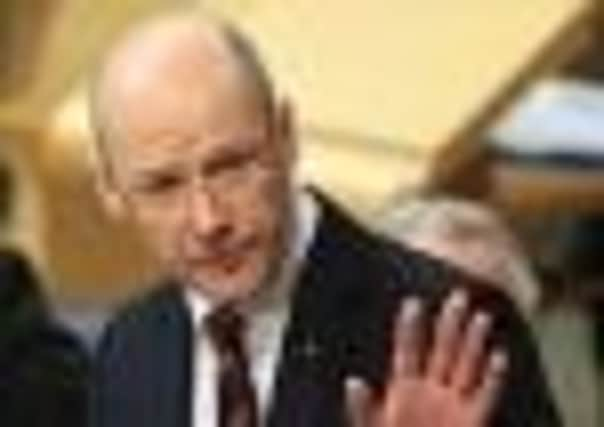Scottish independence: No tax rise plan - Swinney


• SNP will not increase taxation on the oil industry, says Swinney
• Swinney suggested he wants a “competitive business tax regime to attract business to Scotland”
Advertisement
Hide AdAdvertisement
Hide Ad• Mr Swinney conceded he had to make “difficult decisions” on further education funding
Mr Swinney’s vision of an independent Scotland would also see no rise in oil industry taxes and a “competitive” tax regime for businesses.
The idea that the taxation regime outlined by the finance secretary would suffice after independence was attacked by opposition parties, which demanded to know where the money would come from for public services. But Mr Swinney argued that low business taxes would stimulate economic growth, creating enough wealth to allow an independent Scottish Government to resist the need to raise personal taxes, such as income tax and national insurance.
The glimpse into the economic policies the Scottish Government would pursue if there is a break-up of the United Kingdom came in an interview with BBC Radio Scotland yesterday.
Defending the Scottish Government’s budget, which he announced this week, Mr Swinney said it was the wrong time to look at raising taxes.
“I don’t think at this particular moment – in terms of the pressure that household finances are under – that this would be a moment for a tax rise for households,” Mr Swinney said.
He added that he did not expect personal taxes to increase if Scotland left the UK and gained full control of taxation.
He said: “I don’t envisage increases in personal taxation in an independent Scotland.”
Advertisement
Hide AdAdvertisement
Hide AdHe said in this scenario he would not increase taxation on the oil industry and would want a “competitive business tax regime to attract business to Scotland”.
This, he said, would help businesses and “grow the economy and thereby grow the tax base”.
Mr Swinney added: “The purpose of that is to increase the tax take by delivering a stronger and bigger economy.”
Ken Macintosh, Labour’s finance spokesman, ridiculed Mr Swinney asking how he would afford his taxation plans.
“The SNP have always tried to sell their idea of a separate Scotland as being some Scandinavian nirvana, with outstanding public services,” Mr Macintosh said.
“We now know that under their plans, there would be no income tax rise, no tax rise on oil and gas, cuts to corporation tax, Tory cuts would be reversed and free services for everyone would be constitutionally protected. So where is the money going to come from?
This is make-believe stuff. The SNP are promising everything to everyone in a desperate bid to win the referendum in 2014. It is nonsensical and laughable. Scots see through all of this and that’s why a stubborn majority rightly won’t buy into the false prospectus being touted by the SNP.”
The finance secretary was speaking the day after the Institute for Fiscal Studies (IFS) warned that diminishing oil revenues would have a major impact on the Scottish economy if the country votes Yes in 2014.
Advertisement
Hide AdAdvertisement
Hide AdThe IFS report said that by 2017, oil production is expected to have fallen by 16 per cent and gas production by 15 per cent when compared with 2011.
Revenues are also likely to be depressed as the result of falling oil price and could be down as much as by 17 per cent between 2011 and 2017.
Murdo Fraser, the Tory convener of the Scottish Parliament’s finance committee, also attacked Mr Swinney’s plans and claimed the IFS report showed the difficulty of becoming too reliant on oil for revenue.
Mr Fraser said: “The SNP has hinted at a list of expensive luxuries a separate Scotland would have. This is in addition to policies it can’t currently afford like universal free services. What it refuses to do is detail how these fantasies would be paid for.
“If John Swinney isn’t going to hike taxes to fund these policies, the only option left would be to radically increase borrowing, and we know the mess that can get a country into.
“The news that oil and gas revenue looks set to tumble by almost a fifth shows just how fluctuating a commodity it can be.
“That is why it is foolish for the Scottish Government to be so reliant on it.”
Economists said maintaining economic growth held the key to making the economy work without raising taxes.
Advertisement
Hide AdAdvertisement
Hide AdDavid Bell, professor of economics at Stirling University, said: “What you would have to expect is more rapid growth if you are going to have to solve the issue of Scotland’s fiscal balance. The gap between spending and taxes raised has to narrow and increasing growth is one way of doing that. There has to be a very clear plan as to how this tax regime will guarantee that extra growth.”
Another way of narrowing the gap, said Prof Bell, would be to raise indirect taxes such as VAT or council tax – both of which would be unpopular.
John McLaren, a political economist with Glasgow University’s Centre for Public Policy and the Regions, said: “I don’t suppose any political party is inclined to raise personal taxes. At a UK level it is inconceivable to keep on going the way we are. Something has to give, whether that’s taxes going up or borrow more.”
Mr Swinney made his comments on taxation as he defended the spending plans set out in his Budget for 2013-14, in which he opted not to use the limited tax-raising powers he already has to vary income tax.